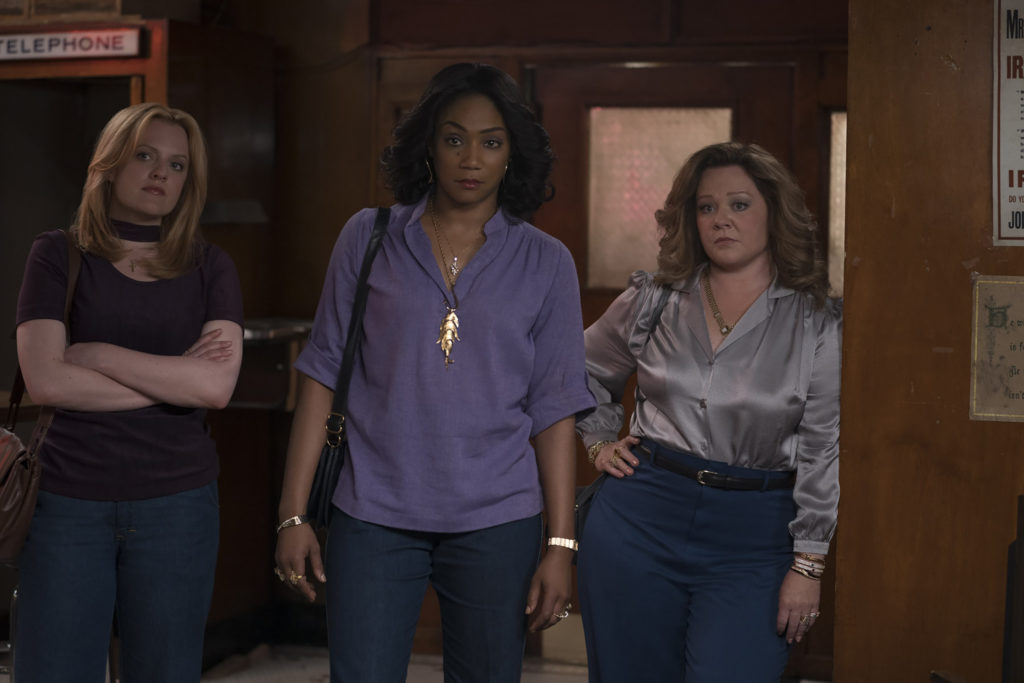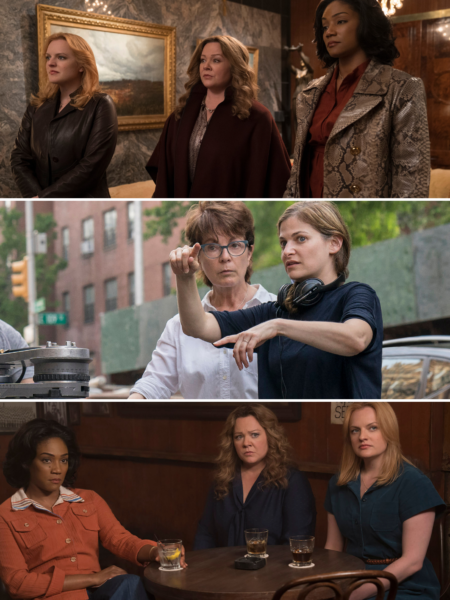In theaters on August 9, New Line Cinema’s The Kitchen flips the mob movie script. Set in 1970s Hell’s Kitchen, the film centers on three women who, after their Irish mobster husbands get arrested, find themselves in need of money to support themselves. What’s a woman to do … except take over the operation for herself? Turns out, between the three of them, Kathy (Melissa McCarthy), Ruby (Tiffany Haddish), and Claire (Elisabeth Moss) are actually better at running the mob than the good ol’ boys who look down on them as powerless housewives. Not that things are easy. This is still a mob movie after all.
The Kitchen represents a departure for actresses McCarthy and Haddish, best known for their comic work. Also jumping into something new was writer/director Andrea Berloff, who’s racked up screenwriting work both credited and uncredited over a decade-plus career. “The best training to be a director of a studio movie is to put in 15 years writing screenplays,” she quips.
Berloff’s best-known movie—and the one that garnered her an Oscar nomination—is Straight Outta Compton, the 2015 hit that dramatized the rise to fame of rap group NWA. It was Compton, unsurprisingly, that helped Berloff sell her vision of The Kitchen to Warner Bros. execs. She’d already written the script, adapting Ollie Masters’s comic series. When it came time to sell herself as the movie’s future director, Berloff “went in there and gave a really impassioned pitch about how this is going to be a big, fun event movie. A movie that people are dying to see, just in the way Compton was. I laid out for them that I see this as a big, fun, entertaining movie that we can turn into a real event if done right.”
An undercurrent in Berloff’s pitch was a theme that runs through The Kitchen itself. As put by Berloff: “Don’t underestimate people. Don’t underestimate comedians, because you know what? They’re some of the most talented women out there. Don’t underestimate what they can do. Don’t underestimate me. I’m not just a writer. I can direct, too. I hope that message permeates. That feeling of empowerment does not apply just to actresses or directors. It applies to everybody. That’s the universal feeling that I want people to hook into.”
Shot in four of New York’s five boroughs (sorry, Queens) and Long Island, The Kitchen pairs a retro style with a visual aesthetic that consciously avoids the sort of lo-fi grittiness many other directors would have drifted to, particularly in this genre. To that end, the clothes—as chosen by costume designer Sarah Edwards—are authentic to the period yet steer clear of the more ridiculous end of the ’70s fashion spectrum. “Sometimes ’70s clothes look silly to us today. It’s got to be pieces of that era that still translate into this era. The women look fantastic in every scene,” says Berloff. With cinematographer Maryse Alberti (Velvet Goldmine, The Wrestler), Berloff aimed to present a vision of ’70s Hell’s Kitchen—the old storefronts, trash piling up on the sidewalks—that’s colorful, not washed out in shades of gray and sepia.
“It’s a mantra that I’ve been repeating since I was hired to do this in 2016: If this movie’s not fun, people aren’t going to be entertained,” explains Berloff. “If it’s too dark and gritty, it’s not fun. I want to have a great time when I go out to the theater, and I hope that this movie has done that. I think if it was too gritty, people would be turned off and wouldn’t want to see it. That’s a reason to go to the theater: You want to see these actresses in these roles. They look great, and they’re having fun, and you’re going to have fun. That was really, really clear to me from the outset.”
“Fun,” however, doesn’t mean careless. As a screenwriter, Berloff is a heavy researcher. With The Kitchen, unlike Straight Outta Compton, she wasn’t writing about real people, so her research tended more toward the realities of living in 1970s New York. She looked into “the Irish mafia, what that looks like—past and present. I also did a lot of research into what society was like in 1978, 1979. What was it like for women? What was it like for people of color? What was it like for poor people? And what was New York City like in that era? What was going on in society? The city was broke. That meant that the trash wasn’t picked up, that nothing was taken care of. What must it have felt like to live in a city that was filthy? It’s all that texture that makes [the movie] feel real.”

Berloff acknowledges her “incredible department heads”—including production designer Shane Valentino—“who cared as much about detail and specificity as I did. I was also able to collaborate with an incredible team of artists who understood the joy of research and knowledge.” Still, at a certain point, it’s time to close your research tabs and get down to actually making the movie. “Ultimately, I’m making a piece of entertainment. This isn’t an intellectual exercise. That’s part of what I love about my job, is that I can take all of that amazing, rich research and put it through the movie translator and make it into a really fun piece of entertainment that’s about something.”
As passionate as Berloff is about The Kitchen, both as a writer and director, she views herself as not being “that precious about my work” in general. Put another way: What serves the movie, not the individual, is paramount. “When you’re hired to write or direct a studio movie, you are hired by a corporation to do a job for them. I think that you are all the more powerful when you can take your emotions out of that situation. We are making a product for a corporation, and that’s fine. There’s nothing wrong with that. I’m thrilled that I work in that space.”
That said, the mob movie genre is something that Berloff has wanted to tackle for quite some time. “I tend to write more male-driven material because, frankly, that’s pretty much all people wanted to pay me for in the past,” she says with a chuckle. “But putting women in these roles in an authentic way has been my goal for a very long time.”
And the roles are all quite different. Taking over the Irish mob, after all, requires a blend of different skill sets. Kathy (McCarthy) is diplomatic, while Claire (Moss) is more of a live wire, the result of years of abuse at the hands of her now-incarcerated husband. (In The Kitchen, Moss is at the center of film history’s most romantic cutting-up-a-body scene, a distinction that isn’t likely to be held by another actress anytime soon.)
Most surprising in the cast is Haddish as Ruby, embittered by the racism of her adopted social group but determined to do whatever it takes to get ahead. McCarthy and Haddish are both best known as comic actresses, but McCarthy is coming off an Oscar-nominated dramatic turn in Can You Ever Forgive Me? Haddish is still far and away best known for her breakout role in R-rated comedy Girls Trip. The Kitchen’s more dramatic material, while still making use of the actresses’ comedy chops, certainly marks a departure.
Haddish landed on Berloff’s radar when Girls Trip was in theaters, “just starting to build into a phenomenon—but it was not there and she was not there.” The Kitchen producer Michael De Luca recommended that Berloff and Haddish have lunch, a meeting that proved fruitful. “She completely blew me away. There’s such a depth to her, so much soul, so much heart. She’s such a kind person. I came away from that lunch thinking she could do anything. She had read the script on her own and really wanted the part. First she went to Mike De Luca, and then she came to me, and then the studio. She worked for it. She went out there and got herself that part.”
Also contributing to The Kitchen’s large ensemble are Margo Martindale, playing Ruby’s mob-wife mother-in-law; Domhnall Gleeson, as one of the women’s early allies; Brian d’Arcy James, as Kathy’s husband; Bill Camp, as a rival Italian mafioso; and Common as an FBI agent monitoring Hell’s Kitchen. Warner Bros. releases The Kitchen in North America on August 9.



Share this post